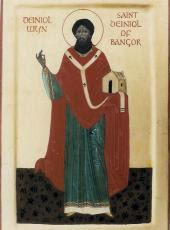On September 11th pro-life advocate Jim Pouillon was murdered in Michigan. This did not get the same press coverage as the doctor who was killed last year but none the less he was murdered for his pro-life activities by a person who was upset with his message. How ironic it is that a pro-life advocate was killed for being pro-life…
California Catholic Daily has an article this week by Father Thomas Eutenerer, president of Human Life International about the killing and at the end of the article the newspaper printed some comments received by the local TV station regarding the killing. Most of the comments focused on the signs that some people hold at anti-abortion events.
Fr. Philip focused on one of the comments and I will do the same. “I’ve never seen this man before, but I’ve seen others like him. The signs are so offensive that the issue becomes about the sign instead of being about abortion. He hurts the pro-life cause and I’m glad that he’s gone.” Okay aside from the fact that the person ends the statement with “I’m glad that he’s gone” what do the signs say about the movement, whatever movement it may be?
I took exception to the signs linking Pres. Obama with Hitler and other Nazi signs that some of the Tea Party folks were holding and I guess I would take exception to some of the signs that anti-abortion folks hold as well. Sings depicting aborted babies and other graphic images hurt the pro-life movement as much as the Nazi signs hurt the Tea Party movement. I agree with one part of the above quoted statement, “The signs are so offensive that the issue becomes about the sign instead of being about abortion” The media focuses on the signs because that is what they see. The media focused on the Nazi signs because they are so incendiary that is what gets the attention. The same is true with anti-abortion signs.
I agree with Fr. Philip that these signs hurt the cause more than help it. I am, and I have said this in public ans here on the blog, pro-life in all that that term means. I attended my first March for Life in Washington, DC this past January and had a great, prayerful experience and plan to go again this year. Just as I will not associate with the Tea Party movement any longer because of the signs being held in DC I have my doubts about the pro-life movement as well. However I did not see many incendiary sings in DC but I have seen them in the past.
Here in Worcester there is a clinic the performs abortions and next door is a rescue office. In the office is a chapel where Catholic Mass and Orthodox services as well as protestant service are held. The rosary is said daily, and once a month an Orthodox service is said on a Saturday morning. I have participated twice in this service. This is what we should be doing. This is the kind of activity that we should be participating in. By hold signs that show aborted babies we are no better than the folks carrying the signs of Pres Obama and Speaker Pilosi as Hitler!
As I said in the post about the Tea Party, this is the minority of people but, as it did with the Tea Party, we all get associated with them and that is not good. There is not justification for murder on any level. We are all created in the image and likeness of God and have the Divine Spark and murder is wrong. But let’s tone things down a little and take a breath. March, yes! Pray, most defiantly, but keep the signs at home.





